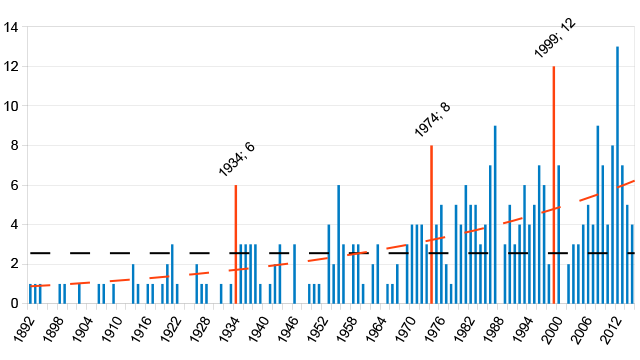
“Flood” of people’s initiatives poses no threat

Critics warn that a reported huge increase in the number of people’s initiatives is clogging Switzerland’s political system. Scientific evidence shows that in reality the situation is more complex.
Calls for a reform of the system of direct democracy are a recurrent topic in Swiss politics.
Over the past few months, several politicians and experts have suggested setting a higher threshold for the minimum number of signatures for initiatives and referendums. A small centre-right political party wants to link the number of signatures to the actual number of citizens.
It currently takes at least 100,000 citizens signatures for an initiative to be put to a nationwide vote. The figure has been unchanged since 1977 and represents about 2% of the electorate. This compares with 8% when the right was first introduced in 1891.
But two studies found no obvious correlation between the size of populations in different cantons and the number of initiatives that made it to the vote at cantonal level. This is despite the fact that the number of signatures required ranged from 0.75% to 5.46% of the electorate in individual cantons.
More but no flood
There is no question that the number of initiatives brought to a vote at a national level annually has risen over the past 125 years.
In total, 317 people’s initiatives gathered enough signatures to be brought to a vote, an average of 2.6 proposals for constitutional amendments per year.
Number of initiatives with sufficient signatures (1892-2015)

Political scientist Marc Bühlmann form Bern University says there is no reason for concern, dismissing the notion of an “initiative flood” as perceived by some politicians.
He says it is not admissible, from a scientific point of view, to describe the growing number of initiatives as a marked increase. The exception being the 24 people’s initiatives launched around the parliamentary elections in 2011.
Quite the contrary. Bühlmann says it is astonishing that the percentage of initiatives, which won the required signatures to be brought to a nationwide vote, has remained stable. It hovers around 66%. This is regardless of the effectively lower percentage threshold due to growing electorate over the years.
Digital
The discussions about a possible increase in the number of signatures has gained momentum with digitalisation, notably the collection of signatures over the internet.
Political scientist Claude Longchamp estimates that is possible to gather up 10,000 signatures within one day under particularly favourable conditions.
He says the new technical possibilities will have an impact on the process of opinion-shaping and lead to a debate about whether the current system of signature-collecting needs an overhaul.
This text is based on an article published by swissinfo.ch in Italian. The full version can be found here.
It is part of #DearDemocracy, a platform on direct democracy issues, by swissinfo.ch.

In compliance with the JTI standards
More: SWI swissinfo.ch certified by the Journalism Trust Initiative


























You can find an overview of ongoing debates with our journalists here . Please join us!
If you want to start a conversation about a topic raised in this article or want to report factual errors, email us at english@swissinfo.ch.